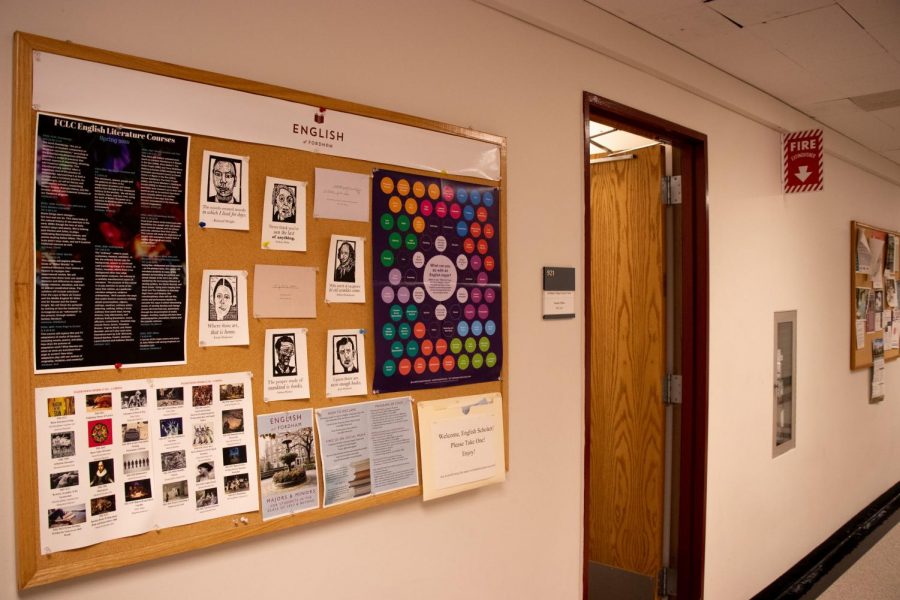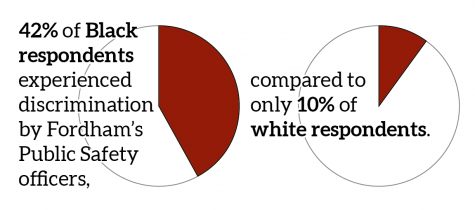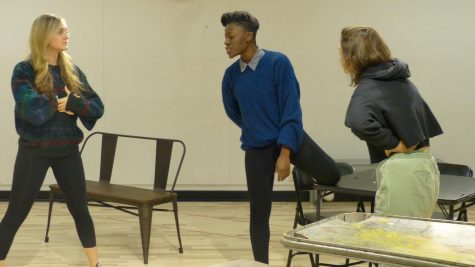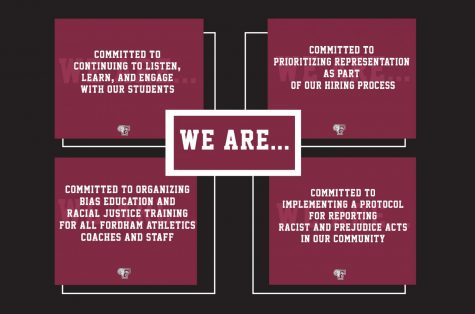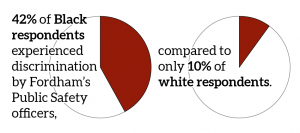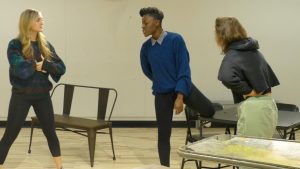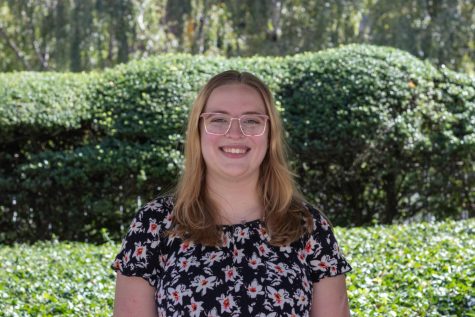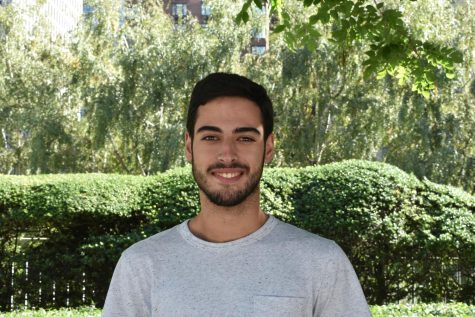Departments Work Toward an Anti-Racist Future
English and communications and media studies departments plan initiatives to foster inclusivity
The English department founded the Diversity and Social Justice Committee in 2016 and will now begin editing its syllabi and work toward accountability.
November 11, 2020
After the murder of George Floyd, conversations about racism began to be more widely discussed on campus. Fordham students said that the university’s response lacked concrete action and wanted more than Fordham’s thoughts and prayers. Throughout the summer, some academic departments took it upon themselves to take action.
Communication and Media Studies Department
The communication and media studies (CMS) department began preparing its anti-racist plan over the summer. Co-chair of the Diversity and Inclusion Committee and CMS Professor Anirban Baishya explained that there was a large number of faculty in the department who expressed a desire to take action.
“We just felt that there was a need to acknowledge and to say something and to take some accountability,” Co-chair of the Diversity and Inclusion Committee and CMS Professor Jennifer Clark said.
This is a realignment of our department, and that is a cultural shift, that’s an economic shift that requires not only our desire, but it requires the support of other participants and other players, including the university itself. Jennifer Clark, co-chair of the Diversity and Inclusion Committee and CMS professor
The plan was drafted by volunteers, utilizing information the department had been gathering since earlier this year. They then sent it out for review by the entire department. One of their main concerns while creating the plan was making sure the promises listed were within reason.
“One of the biggest things to me was, can we do this? Is this a feasible plan? We don’t want to promise something we can’t deliver on. That was a constant concern,” Clark said.
The plan states that the department will hold Fordham accountable for the promises it has made in its Addressing Racism and Educating for Justice action plan and will partake in other initiatives from Fordham: “(We) want to make it clear that we support the ASILI statement of demands wholeheartedly.”
In June, ASILI, the Black Student Alliance at Rose Hill, released a list of 11 demands for Fordham to address its anti-Blackness — only three of which have been met by Fordham. The CMS department initiatives address two of the demands from ASILI that Fordham did not meet.
The first initiative supports ASILI’s demand to cut ties with Aramark due to its historic connections to prison abuse and racism. Racism within Aramark was recently an issue when in 2019, it served “watermelon water” at New York University during Black History Month. The anti-racist plan states that the department will no longer use Aramark to cater events, and it will promote the use of an ethics board when deciding whom to contract.
ASILI has also demanded that Fordham acknowledge and look into Public Safety’s ties with the New York Police Department (NYPD).
“We support the call from ASILI … to acknowledge and assess the university’s relationship with the NYPD and ensure that students and local community members of color are not the subject of racial profiling by public safety officers,” the plan states.
Both Clark and Baishya said that the department used social media to gather feedback from students. Clark explained hearing from all students on Instagram, not just student groups, allowed them to not make assumptions about students’ demands.
Clark and Baishya emphasized that this plan is not going to be quick or easy as it is not a “Band-Aid solution.” The plan was created with the knowledge that they wouldn’t be able to get it all done in one year.
“This is a realignment of our department, and that is a cultural shift, that’s an economic shift that requires not only our desire, but it requires the support of other participants and other players, including the university itself,” Clark said.
English Department
No university — no academic department can avoid the fact that these institutions are founded on white supremacist logic. James Kim, associate professor of English
Within the English department the Diversity and Social Justice Committee (DSJC) is chaired by Associate Professor of English James Kim. It was first founded as a working group in 2016, but became a permanent part of the department in 2017.
“No university — no academic department can avoid the fact that these institutions are founded on white supremacist logic,” Kim said.
In the summer of 2020, the DSJC created an anti-racist pedagogy group in response to police brutality against Black people.
“We just did a bunch of readings on what it means to create an anti-racist class, not just in terms of the content that gets taught, but also the way in which courses are administered,” Kim said.
The English department released a statement regarding how it will address racism within itself, echoing the initiative from the CMS department.
“Our abhorrence of the ongoing violence against Black, Indigeneous, and other people of color obliges us to take account of, and take responsibility for, our own cultural and institutional roles in perpetuating white supremacy,” the statement reads.
The statement went on to say that DSJC will spend the next 12 months examining the department, followed by the release of a second plan in October 2021.
“We’re interested in the histories of the department, the numbers, what do our students look like, what kinds of students are we attracting,” Kim said. “We’re also interested in scrutinizing our syllabi and reimagining our syllabi where necessary.”
One action previously taken was requiring a “Race and Social Justice” course for all English majors, along with a “Difference and Intersectionality” course for English graduate students.
The English department is also looking forward to its Bridge Program, which allows students from Bronx community colleges to join the English department.
Beginning in November, the English department will also be having their composition classes examined by two outside consultants.
“They’re going to give us a report on the best practices at other universities and a significant arm of that study … is how do we teach composition I and II in a way that doesn’t support white supremacy,” English department Chair Mary Bly said. She further revealed that since all students are required to take a composition class, it is an important starting point.
The department is also focused on creating opportunities for faculty to learn about racial justice, including staging an accountability group. When the plan was published, the department had submitted a grant proposal for a Teaching Race Across the Curriculum program, which was later approved by the Office of Diversity and Equity.
“We were given $30,000 by Fordham in order to institutionalize a year long colloquium on teaching racial justice that’s going to give all of our faculty training and anti-racist pedagogy,” Bly revealed.
The English department is also looking forward to its Bridge Program, which allows students from Bronx community colleges to join the English department. Students will take a class in the summer and receive support from faculty before fully joining the program in the fall.
“We understand too that this work is neither easily nor quickly done. With this statement, the Fordham University English Department publicly commits to seeing it through,” the statement ends. It also outlines that the next steps will involve deeply looking at the department and their practices.
The English and CMS departments are leading the way for other departments to released their own anti-racist plans in the future.
“Diversity work doesn’t have a finish line,” Baishya said. “So in some ways, we should have to continuously go back and revise what we’ve done.”

